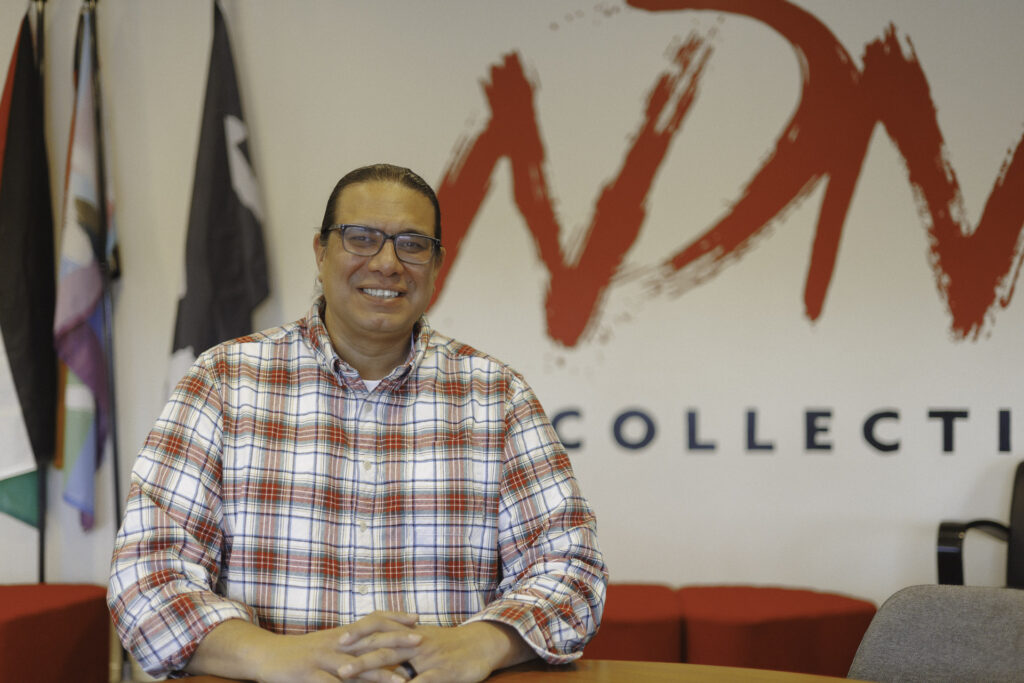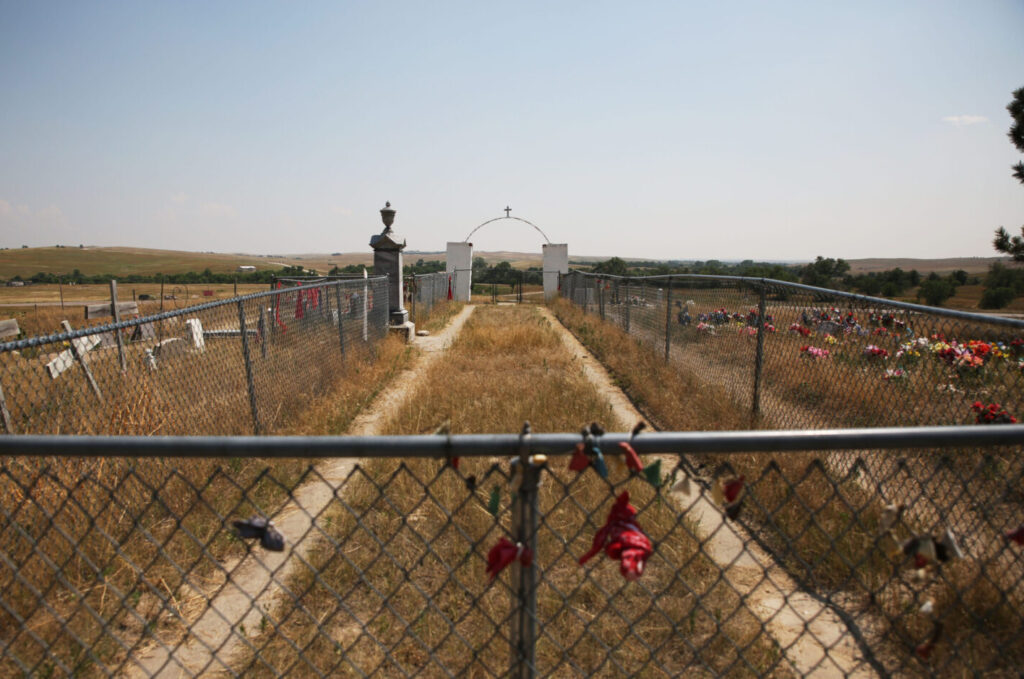A monument erected to victims of the 1890 Wounded Knee Massacre stands in the middle of the memorial and cemetery on June 30, 2024. (Makenzie Huber/South Dakota Searchlight)
A man who served on the panel that reviewed medals awarded for the Wounded Knee Massacre said a majority of the members focused on individual soldier conduct at the expense of the broader issue: whether any medals should be awarded for a massacre.
Wizipan Little Elk Garriott, a member of the Rosebud Sioux Tribe in South Dakota, told South Dakota Searchlight this week that he served on the review panel. He was the Department of the Interior’s principal deputy assistant secretary for Indian affairs at the time, and was one of the department’s two panel members.
He said the other three members of the panel represented the Department of Defense.
“They were looking for evidence that individuals committed war crimes, essentially,” Garriott said. “The broader question — that this was a massacre in which women and children were killed and therefore not deserving of medals — was simply not part of the conversation.”

The Department of Defense created the panel and undertook the review last year during the Biden administration, but the administration never announced or published the panel’s findings or recommendations. President Donald Trump’s Defense secretary, Pete Hegseth, announced last week that Medals of Honor awarded for the massacre will not be rescinded. He called the massacre a “battle” and said the soldiers “deserve those medals.” He cited the panel’s work as justification.
Garriott said the Department of Defense representatives on the review panel prevented consideration of records containing eyewitness accounts from Lakota massacre survivors, ignored the illegality of soldiers trespassing in an area reserved by treaty for Indigenous tribes, and failed to apply the same standards of valor used for Medals of Honor awarded in other engagements.
“The military members just kept saying, ‘Show me evidence that so-and-so killed an innocent person,’” Garriott said.
He thought that approach ignored a larger truth.
“You can be brave while being part of a group committing a heinous act,” he said. “That does not mean you should get a medal for it.”
Massacre history
The massacre occurred in 1890, after years of conflict between the Lakota nation and the U.S. government had ended with many Lakota people ordered onto reservations. On Dec. 29 of that year, a large group of Lakota people traveling to the Pine Ridge Agency in southwestern South Dakota made camp near Wounded Knee Creek, where they were surrounded by hundreds of Army soldiers. A shot rang out while the soldiers tried to disarm the camp, and the soldiers opened fire.
Fewer than 40 soldiers were killed (some by friendly fire, according to historians), while estimates of Lakota deaths ran from 200 to 300 or more, depending on the source, including men, women and children. After some of the bodies froze on the ground for several days, a military-led burial party placed them in a mass grave.
One hundred years later in 1990, Congress passed a resolution expressing “deep regret” for the massacre.
The Department of Defense said last year that “approximately 20” soldiers received a Medal of Honor for participating in the massacre. The number is approximate because historical records associated with some of the medals are incomplete or unclear. The department did not immediately respond to a request for comment this week.
Hegseth references unreleased report
The review panel ultimately voted 3-2 against rescinding any medals, Garriott said, with the three majority votes coming from the Defense panelists.
In a social media video last week, Hegseth held a report that he said the review panel produced. The department has not published the report and has not fulfilled South Dakota Searchlight’s request for a copy. South Dakota state Rep. Peri Pourier, R-Rapid City, who is a member of the Oglala Sioux Tribe, said Thursday in a news release that she plans to propose a legislative resolution urging the Department of Defense to release the full, unredacted findings of the panel.
Medals awarded for Wounded Knee Massacre won’t be rescinded, Hegseth announces
Garriott said he does not have a copy of the report. He left the Department of the Interior when the Biden administration ended and now works as president of NDN Collective, a Rapid City-based nonprofit that advocates for Indigenous people.
Garriott said the process felt rushed, lasting only a few months and requiring panelists to squeeze meetings between their full-time jobs. When members visited the Wounded Knee Massacre site in person, only one of the Defense panelists attended, Garriott said, and the panel limited historical testimony to Department of Defense historians.
Garriott said he blames not only the Department of Defense but also former President Joe Biden and his top advisers for the outcome.
“This historical wrong could have been made right, but they chose not to,” Garriott said.
Deb Haaland, a member of the Laguna Pueblo tribe, was the secretary of Interior at the time and is now running for governor of New Mexico. She released a statement on social media after Hegseth’s announcement.
“Awarding medals for the massacre at Wounded Knee is cruelty, not honor. And reaffirming them today only deepens the injustice,” Haaland said. “Standing at the gravesite with descendants of those victims brought home to me how the trauma of that day still lingers in the community.”
Congressional legislation pending
Despite Hegseth’s declaration that the matter is “final,” Garriott said Lakota people will continue to press for rescinding the medals. Multiple efforts to rescind the medals through congressional action have failed, but U.S. Sen. Elizabeth Warren, D-Massachusetts, introduced another bill to do so this year. Members of Congress from South Dakota have not sponsored or cosponsored those bills.
The South Dakota delegation is supporting separate legislation that would add protections for the massacre site. That legislation would place 40 acres of tribally owned land at the site in restricted-fee status, which means it could not be sold, taxed, gifted or leased without congressional and tribal approval.
The Committee on Indian Affairs has advanced the Senate version of the bill, sponsored by Sen. Mike Rounds and cosponsored by Majority Leader John Thune. Rep. Dusty Johnson is the sponsor of an identical bill that passed the House of Representatives in January.
South Dakota Searchlight’s Seth Tupper contributed to this report.
Reaction to Hegseth announcement
Defense Secretary Pete Hegseth’s announcement that he would not rescind medals awarded for the 1890 Wounded Knee Massacre sparked reactions from many Native American leaders.
The National Congress of American Indians said in a press release that Wounded Knee was not a “battle.” The alliance called it the “intentional mass killing” of Lakota men, women and children “seeking safety from invading U.S. soldiers.”
“Honoring those involved in the Wounded Knee Massacre with the United States’ highest military award is incompatible with the values the Medal of Honor is meant to represent,” Executive Director Larry Wright Jr. said in a statement. “Celebrating war crimes is not patriotic.”
Frank Star Comes Out, president of the Oglala Sioux Tribe, issued a statement saying “Secretary Hegseth’s refusal is despicable, untruthful and insulting to the Great Sioux Nation.”
Standing Rock Sioux Tribe Chairwoman Janet Alkire said the massacre was “an unprovoked attack on men, women, children and elders who had been rounded up by the military.”
“The actions at Wounded Knee were not acts of bravery and valor deserving of the Medal of Honor,” she said in a statement. “There is nothing Hegseth can do to rewrite the truth of that day.”
Cheyenne River Sioux Tribe Chairman Ryman LeBeau called the massacre “one of the darkest days in U.S. history.”
YOU MAKE OUR WORK POSSIBLE.





